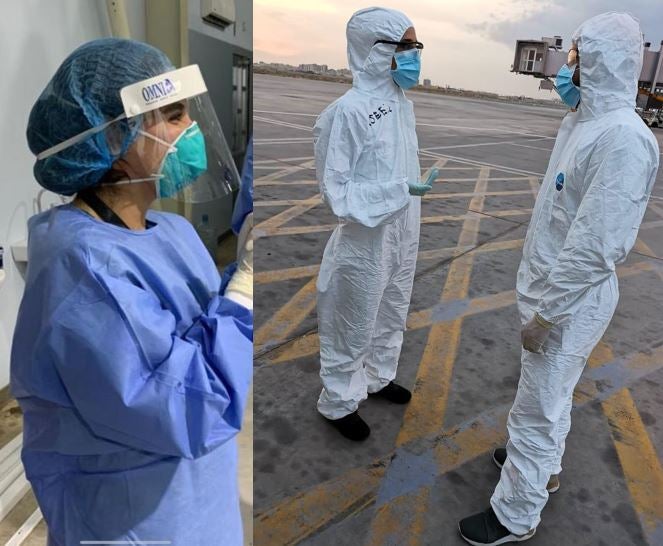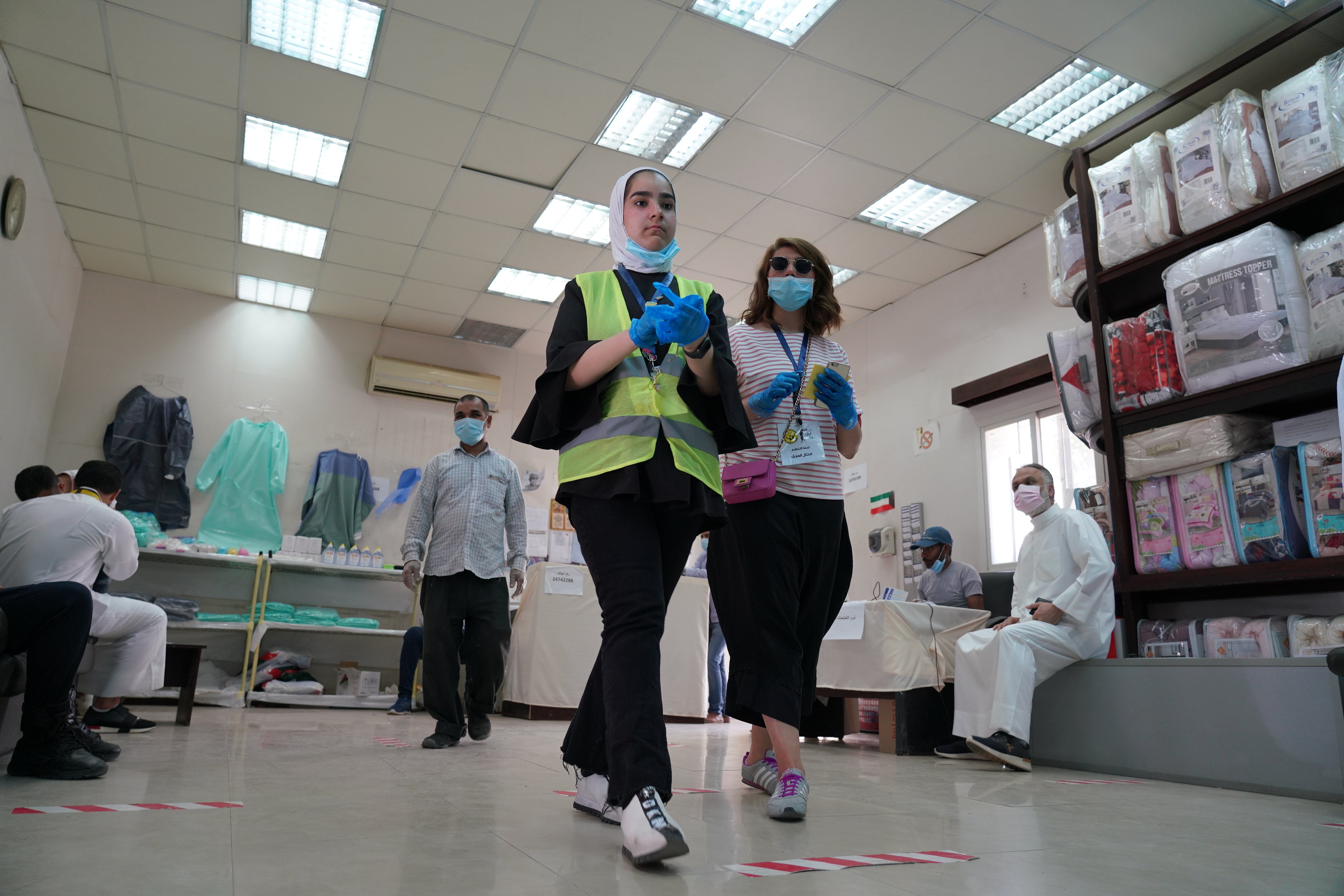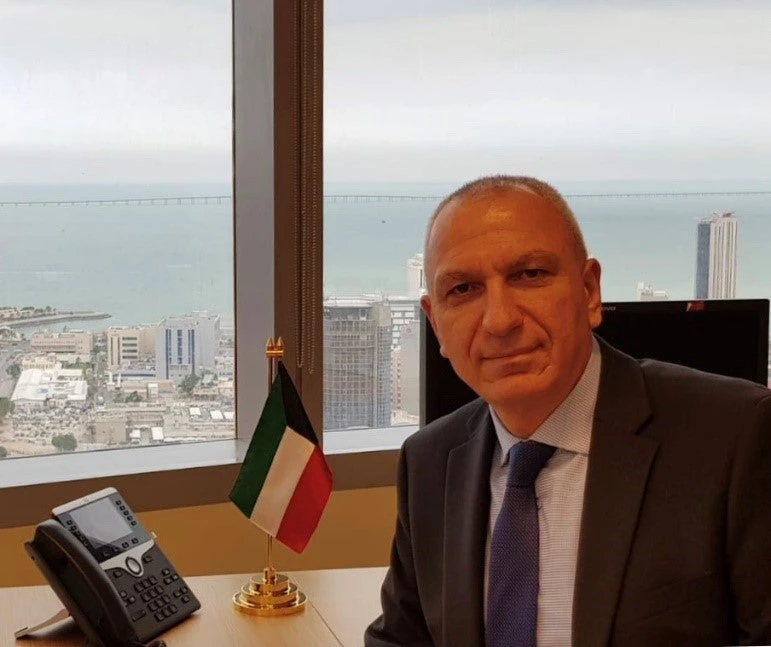 إمرأة كويتية تعمل خلال أزمة جائحة فيروس كورونا. (تصوير مريم عبدالله.)
إمرأة كويتية تعمل خلال أزمة جائحة فيروس كورونا. (تصوير مريم عبدالله.)
Kuwaiti women, long known for their strong role in society, have shown their true courage, spirit, and determination during the COVID-19 pandemic. Historically, women here tended to their homes, children, and cities when men went for months-long fishing and pearl diving expeditions. Now, they have once again risen to the challenge during a crisis. We’ve seen Kuwaiti women mobilize across all facets of life, from first responders to engineers, scientists, and community volunteers. They are truly on the front lines of this battle.
Leading this charge are the two women ministers, Mariam Al-Aqeel, Minister of State for Economic Affairs and Minister of Social Affairs, and Rana Al-Faris, Minister of Public Works and Minister of State for Housing Affairs. Both are working on the ground to ensure that social services are operational and delivering to vulnerable populations, also often working late at night to oversee public works projects.
In addition, women leaders in the community and civil society organizations are volunteering to get many jobs done. “When doors opened for voluntary work in the factory, I was amazed by the number of women, much more than men, who came into volunteer and provide the support needed for the factory to start making surgical masks,” said Emtithal Alenezi, the head of a volunteer group working with the Kuwait Cotton Products Company.
Women are also leading in the health sector, overseeing food security, public health, and other related health fields during this crisis. Scientists are hard at work devising and producing personal protective equipment, and many women have volunteered in cooperation to serve the public.
Orthodontist Sara Merza, one of the first volunteers on the forefront at Kuwait Airport, said, “When my supervisor asked for volunteers to help with the crisis, I registered my name in a heartbeat as a volunteer in the health workforce to aid in any way I could.” Sara was stationed as part of the evacuation team testing the citizens arriving at the airport from abroad.
“A lot of people asked me if I was scared dealing with people who may arrive testing positive for the virus,” Sara said. “Due to the nature of my work as an orthodontist, I am exposed to bacteria and viruses every day. So, I wore my full gear and followed cross-infection control procedures. I hoped for the best and never gave it a second thought.” Sara exemplifies the attitude of many of Kuwait’s women at the front line. “I was never scared. We worked long hours, had sleepless nights, but we got through it together.”
Women community volunteers and civil society organizations are also helping victims of domestic violence where isolation and social distancing has left women vulnerable to abuse. All of these examples of women’s work and more were brought up during a virtual Ghabqa organized by the World Bank office in Kuwait last week in partnership with the General Secretariat of the Supreme Council for Planning and Development (GS-SCPD) and the Women’s Research and Studies Center at Kuwait University.
This event, titled “Gender Dimensions of COVID-19,” brought together many women thought leaders and was held under the patronage of Minister Mariam Al-Aqeel, including senior government officials as well as regional officials. The Ghabqa highlighted the gender-specific effects of the pandemic at the global, regional, and national levels. It shined a spotlight on how women and girls can be affected in distinct ways, and in some areas, face more negative impacts from the crisis than men.
Minister Al-Aqeel said that Kuwaiti women have done well and actively participated in facing the extraordinary circumstances that the country is going through. She said they “raised the banner” side-by-side with their male colleagues, and they ventured to fulfill their national duty in order to preserve the health and safety of their fellow citizens and residents. One of the presenters, Caren Grown, World Bank Senior Director for Gender, said that, globally, women have borne the brunt of the crisis, which has amplified the pre-existing gender gaps in health and education, as well as economic opportunities. Grown further indicated that women need to be at the decision making tables and women’s organizations need to be part of the response. Keeping the gender implications of COVID-19 in sight can allow for more effective responses and actions in the future.
Khaled Mahdi, Secretary General of GS-SCPD, said the country has put women’s economic and political empowerment at the core of the Kuwait National Development Plan. It calls for the doubling of women in leadership roles in the public sector over the next five years, while also increasing representation at the National Assembly and on corporate boards.
The consensus arising from the Ghabqa is that Kuwaiti women have not only led at the front lines of this crisis but have still had to handle the bulk of household and childcare duties. Participants agreed that recovery efforts will need to include women not only at the leadership level, but in operational aspects. This would ensure that future decisions include more flexibility in work-from-home arrangements in the public and private sector. Furthermore, participants agreed on the need for legislation on gender-based violence. A key issue that emerged during the discussion is the need to strengthen mental health and counseling service to women, and to break down the stigma related to receiving such services.
________________________________________________
In Kuwait, a Ghabqa is a late-night gathering during Ramadan (between Maghreb and Suhoor) that brings friends and members of the community together in an atmosphere of joy and happiness, where they can enjoy food in a relaxed setting and discuss topics that range from economic to political to social.







Join the Conversation